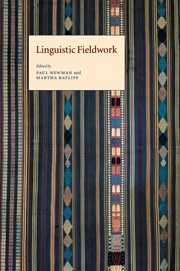Book contents
- Frontmatter
- Contents
- List of figures
- List of tables
- Notes on contributors
- Introduction
- 1 Fieldwork as a state of mind
- 2 Who shapes the record: the speaker and the linguist
- 3 Places and people: field sites and informants
- 4 Ulwa (Southern Sumu): the beginnings of a language research project
- 5 Escaping Eurocentrism: fieldwork as a process of unlearning
- 6 Surprises in Sutherland: linguistic variability amidst social uniformity
- 7 The role of text collection and elicitation in linguistic fieldwork
- 8 Monolingual field research
- 9 The give and take of fieldwork: noun classes and other concerns in Fatick, Senegal
- 10 Phonetic fieldwork
- 11 Learning as one goes
- 12 The last speaker is dead – long live the last speaker!
- Index
Introduction
Published online by Cambridge University Press: 05 June 2012
- Frontmatter
- Contents
- List of figures
- List of tables
- Notes on contributors
- Introduction
- 1 Fieldwork as a state of mind
- 2 Who shapes the record: the speaker and the linguist
- 3 Places and people: field sites and informants
- 4 Ulwa (Southern Sumu): the beginnings of a language research project
- 5 Escaping Eurocentrism: fieldwork as a process of unlearning
- 6 Surprises in Sutherland: linguistic variability amidst social uniformity
- 7 The role of text collection and elicitation in linguistic fieldwork
- 8 Monolingual field research
- 9 The give and take of fieldwork: noun classes and other concerns in Fatick, Senegal
- 10 Phonetic fieldwork
- 11 Learning as one goes
- 12 The last speaker is dead – long live the last speaker!
- Index
Summary
After a long period of neglect, fieldwork in linguistics is beginning to attract real attention and interest again in the United States. This interest has been sparked by a concern in the discipline about endangered languages but now transcends that specific issue. The trend is evident in the involvement of national and international organizations in the effort to publicize the need for language documentation; the growing number of conferences and workshops on endangered languages, linguistic fieldwork, and the role of data in the formulation of linguistic theory; the growth in training programs in linguistic fieldwork; and the greater success fieldworkers have experienced in winning government as well as private grants to support language documentation projects. The Linguistic Society of America (LSA) has provided leadership with the first three of these efforts: its interest in endangered languages and fieldwork was made formal in 1992 when the Committee on Endangered Languages and their Preservation was established. In 1994, the LSA issued a policy statement on “The Need for the Documentation of Linguistic Diversity.” Symposia on fieldwork are now a regular part of the program of the LSA annual meetings and courses on fieldwork practice have routinely been offered in recent years at the LSA summer linguistics institutes.
- Type
- Chapter
- Information
- Linguistic Fieldwork , pp. 1 - 14Publisher: Cambridge University PressPrint publication year: 2001
- 6
- Cited by



